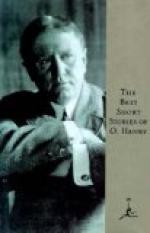At the end of a couple of hours the manager rode up again—the air was thick with dust as though a thousand head of cattle had passed by.
At last he distinguished the form of his new shepherd—a collapsed heap prone upon the ground. Surrounding him were the sheep, a pitiful, huddled mass, bleating plaintively, with considerably more than a week’s condition lost.
“What the dickens have you been doing to those sheep?” shrieked the almost frantic manager.
The ex-sailor managed to gasp out: “Well, sir, I’ve done my best. You told me to keep them on the run, and so I hunted them up and down and round—and now—I’m just dead beat myself.”
TABLE OF COMPARISON
To instill into the mind of his son sound wisdom and business precepts was Cohen senior’s earnest endeavor. He taught his offspring much, including the advantages of bankruptcy, failures, and fires. “Two bankruptcies equal one failure, two failures equal one fire,” etc. Then Cohen junior looked up brightly.
“Fadder,” he asked, “is marriage a failure?”
“Vell, my poy,” was the parent’s reply, “if you marry a really wealthy woman, marriage is almost as good as a failure.”
KNEW HIS JOB
It was Easter eve on leap year, and the dear young thing, who had been receiving long but somewhat unsatisfactory visits from the very shy young man, decided she might take a chance. Robert had brought her a splendid Easter lily.
“I’ll give you a kiss for that lily,” she promised blushingly.
The exchange was duly, not to say happily, made. Robert started hurriedly toward the door.
“Why, where are you going?” asked his girl in surprise.
“To the florist’s for more Easter lilies!” he replied.
AN ANGLOMANIAC
“What are you studying now?” asked Mrs. Johnson.
“We have taken up the subject of molecules,” answered her son.
“I hope you will be very attentive and practise constantly,” said the mother. “I tried to get your father to wear one, but he could not keep it in his eye.”
YANKEE FODDER
Senator Hoar used to tell with glee of a Southerner just home from New England who said to his friend, “You know those little white round beans?”
“Yes,” replied the friend; “the kind we feed to our horses?”
“The very same. Well, do you know, sir, that in Boston the enlightened citizens take those little white round beans, boil them for three or four hours, mix them with molasses and I know not what other ingredients, bake them, and then—what do you suppose they do with the beans?”
“They—”
“They eat ’em, sir,” interrupted the first Southerner impressively; “bless me, sir, they eat ’em!”




